Our history
The link between gender and biodiversity has long been evident: women and girls, particularly from Indigenous Peoples, peoples of African descent, and local communities, play a crucial role in managing and protecting ecosystems. Yet, for many years, global biodiversity policies overlooked this reality. In response, women’s rights advocates and gender experts began organising within the Convention on Biological Diversity (CBD) negotiations to push for recognition and action.
The early days
The inception of the CBD Women’s Caucus dates back to the time when the CBD itself was being negotiated. Some members recognise Vandana Shiva, Wangari Maathai and Bella Abzug as early thinkers and advocates for such a space. Key institutions, including the International Union for Conservation of Nature (IUCN), Women Engage for a Common Future (WECF), Women’s Environment and Development Organization (WEDO), the Indigenous Women’s Biodiversity Network (IWBN), and the CBD Secretariat, played a critical role in the establishment of the Caucus.
In its early years, the Caucus brought together members from governments, UN agencies, women’s organisations, Indigenous Peoples, feminist advocates and civil society reflecting a broad coalition of stakeholders committed to integrating gender perspectives into biodiversity policies.
In July 2008, the CBD Executive Secretary and the IUCN Director General signed a Letter of Agreement tasking the IUCN’s Global Gender Office to support the integration of gender into the CBD. This led to the development of the first Gender Plan of Action (2008-2015).
A primary focus of the GPA was to raise awareness of biodiversity issues among gender-related and women’s organisations and enhance the capacity of women, particularly Indigenous women, to participate in processes and decision-making under the Convention. These efforts resulted in the laying out of the Women’s Caucus. Likewise, the GPA highlighted the need to appoint a full-time gender programme officer at the Secretariat, which, in coordination with the IUCN Gender Office, led the implementation of the CBD GPA.
Building momentum
From 2008 to 2014, WEDO, WECF, IWBN, Global Forest Coalition (GFC) and others, in close collaboration with the late Ms. Marie Aminata Khan, who served as the first Programme Officer for Gender at the Secretariat of the CBD, gave shape to the Women’s Caucus and gathered gender experts and women leaders to advocate for gender justice within the CBD discussions. One of the main achievements of those joint efforts was the increased attention to the first GPA within the CBD, creating momentum to ensure gender was systematically addressed in biodiversity policy discussions.
Over the years, more women’s organisations became actively engaged in the CBD, further strengthening the Women’s Caucus and its impact. Despite the lack of an official seat for many years, women’s rights organisations consistently participated in CBD meetings, strategising, advocating, and delivering statements on key agenda items, particularly at the Conference of Parties (COPs). The year 2010 marked the first time that women from different organisations attending the COP10 in Nagoya formally delivered the first official statement as the Women’s Caucus. Until COP13, the Women’s Caucus had no dedicated seat and would deliver statements from the NGO (CBD Alliance) seat.
In the context of the GPA, a process was underway to enhance the capacity of women’s organisations to engage at the CBD. These efforts contributed to securing a reference to women’s roles in at least one of the Aichi Targets (Target 14), a milestone that later influenced the inclusion of gender considerations in the Kunming-Montreal GBF’s Target 23
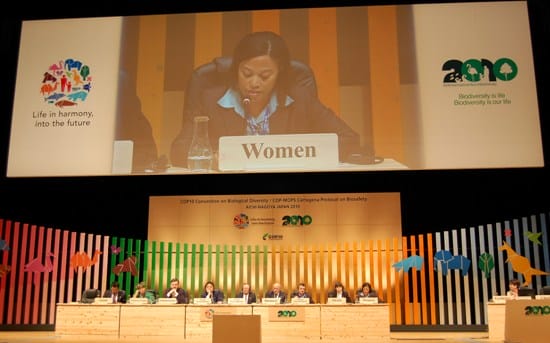
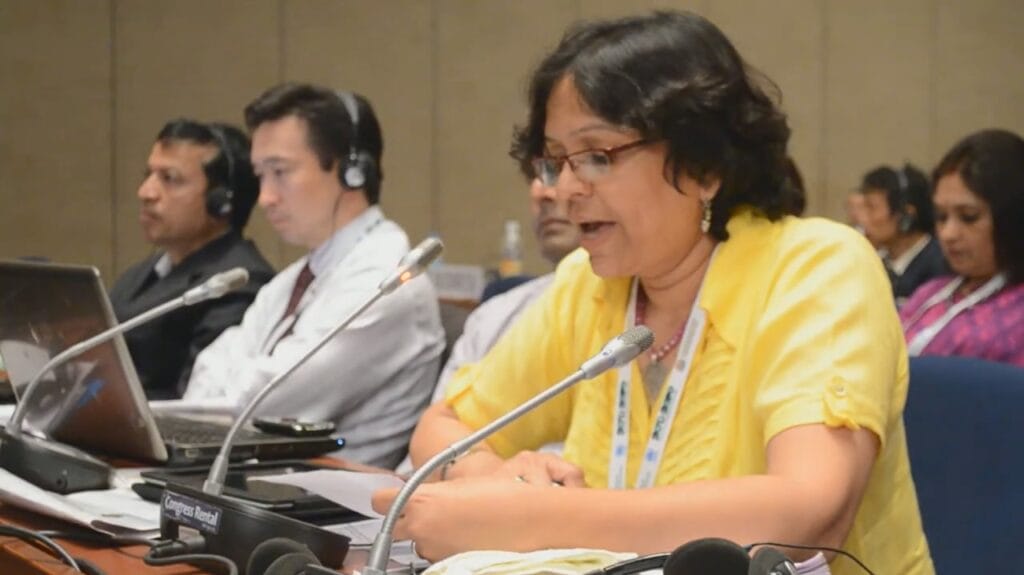
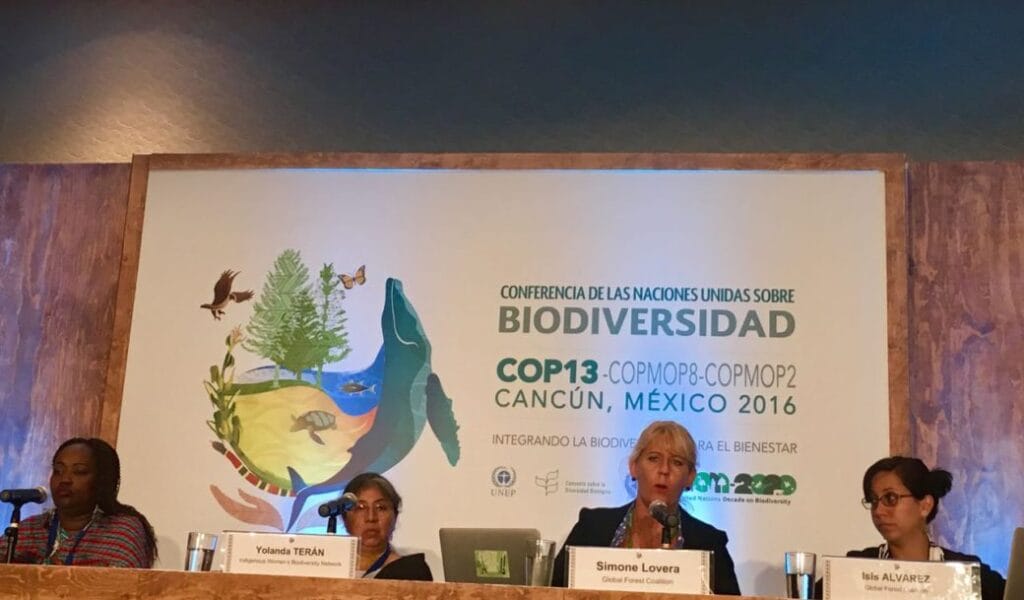
From 2014 to 2018, the Global Forest Coalition (GFC) and Indigenous Women’s Biodiversity Network (IWBN) played a key role in revitalising the Caucus after periods of inactivity. During this time, the Caucus’s impact continued through its influence in the adoption of the second Gender Plan of Action (2015-2020) adopted at CBD COP12 and the first Gender Day at the CBD COP13 coordinated by SCBD together with GFC and IWBN. COP 13 was instrumental as at this COP in 2014, the Women’s Caucus got its dedicated seat to deliver its statements, marking a significant step toward institutional recognition. The Women’s Caucus became the CBD Women’s Caucus (CBD WC). This brought a deep change regarding gender issues at the global level, including mainstreaming gender considerations into the National Biodiversity Strategies and Action Plans (NBSAPs) and monitoring mechanisms, the recognition of gender approaches in biodiversity and climate change, as well as other gender considerations in several decisions adopted.
From 2019 to 2022, the CBD WC made major strides internally thanks to Women4Biodiversity, who consolidated the Caucus coordination and strengthened the platform by cultivating a community of practices through a mailing list, supporting the coordination, awareness raising, capacity building, as well as expanding the membership to engage more organizations in the work of the CBD. For collective identity, a logo for the Caucus was designed, and funds were provided to support the coordination and activities of the CBD WC. This support came at a crucial time, ensuring coordination during the COVID-19 pandemic and maintaining both platform stability and continuous engagement. Additionally, to enhance outreach and member engagement, an Advisory Board of four members from three regions was appointed by the Coordination.
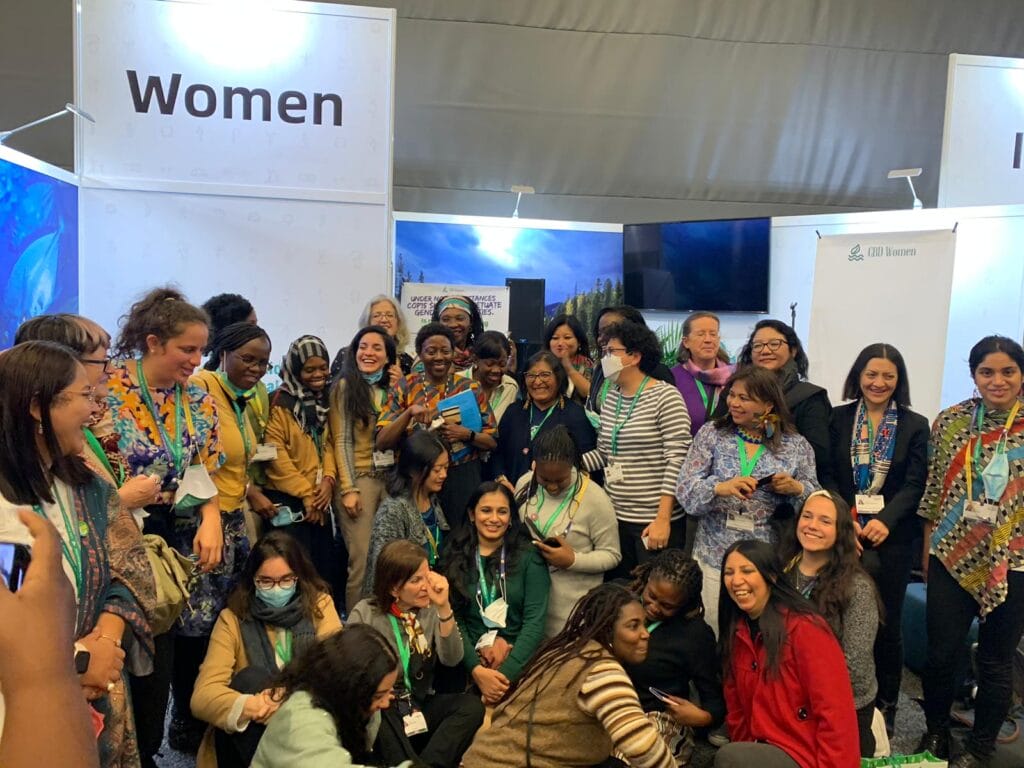

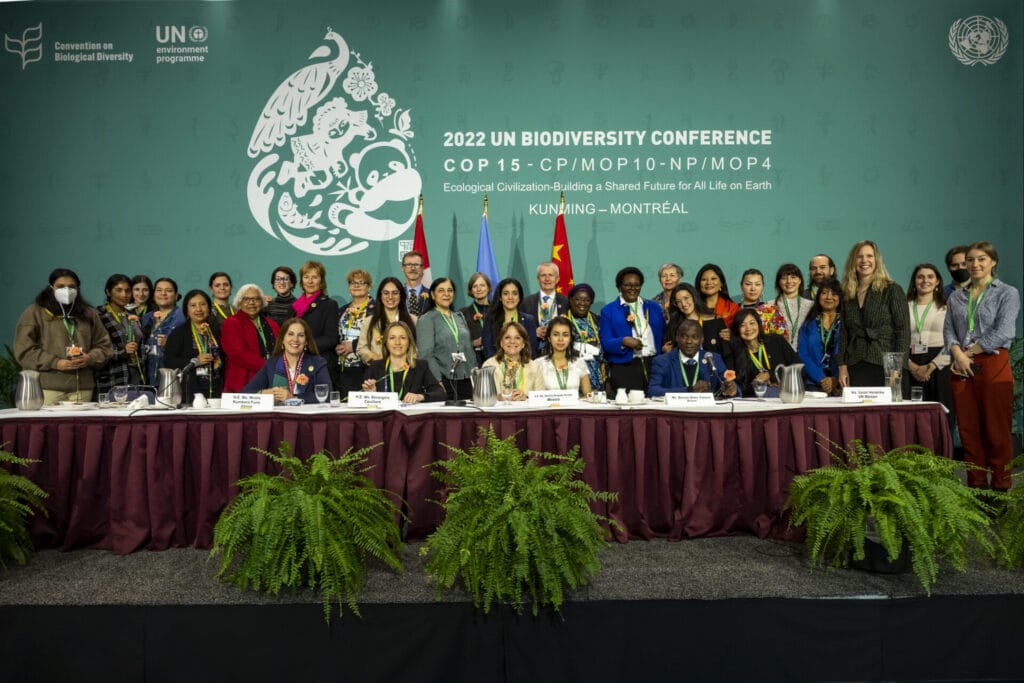
During this period, thanks to the Caucus, historic milestones were achieved in the policy arena, including the adoption of Target 23 in the Kunming Montreal Global Biodiversity Framework and the adoption of the Gender Plan of Action 2022-2030 —a groundbreaking achievement recognising gender equality as integral to biodiversity policy at all levels, with a particular focus on women and girls from Indigenous Peoples and local communities.
A transparent structure for a collective voice
From 2023, the CBD Women’s Caucus, guided by its by-then Advisory Board, worked on the collective development of its first Statute, which, after five months of consultations and text contributions, was adopted by acclamation in December 2023. A milestone for the Caucus, marking a historic step in its organisational development. The Statute establishes the structure and governance of the CBD Women’s Caucus, institutionalising it as an independent, self-organised, permanent, and sustainable entity within the CBD framework, guided by principles of collective ownership, shared leadership, and collaborative action.
Throughout 2024, the CBD Women’s Caucus continued to flourish, further developing its internal regulations, including policies on governance, finance, representation, membership admission and revocation, and communications, among others in alignment with the Statute. This process helped consolidate its governance and operational structure, including the establishment of a Board of Directors to be selected through an open process. Continued efforts from the Board, Coordination, and members—through both volunteer contributions and successful fundraising—ensured progress in key areas such as communications, policy, and capacity development. In this regard, financial support from Avaaz, FARN, WEDO, WWF, IUCN, and the Japan Biodiversity Fund through the CBD Secretariat in 2024 played a crucial role in sustaining and expanding the Caucus’s activities.
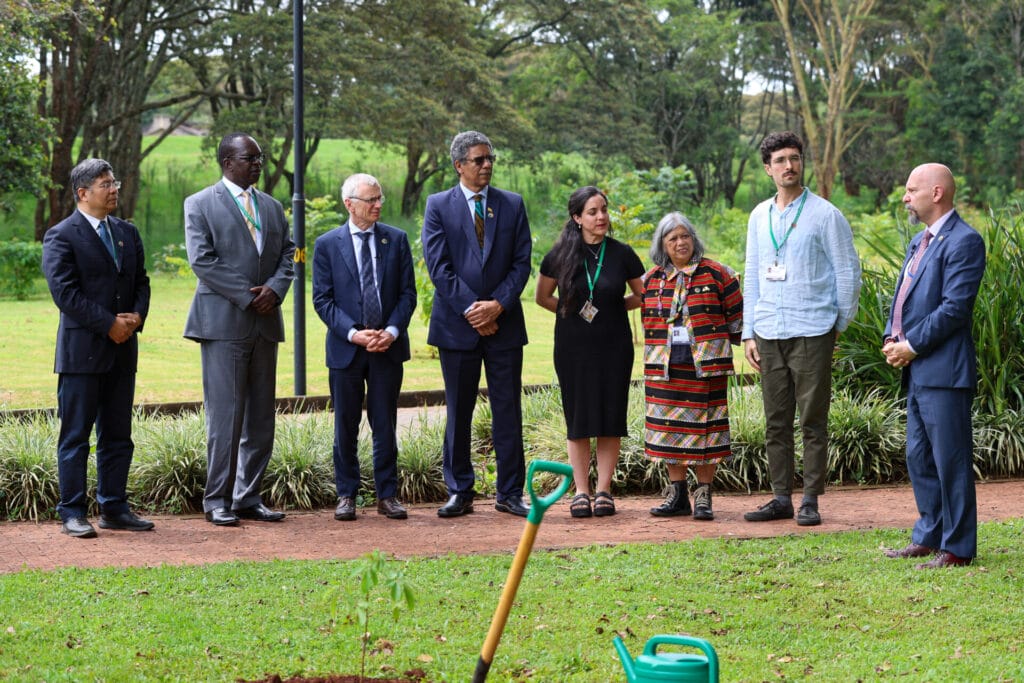
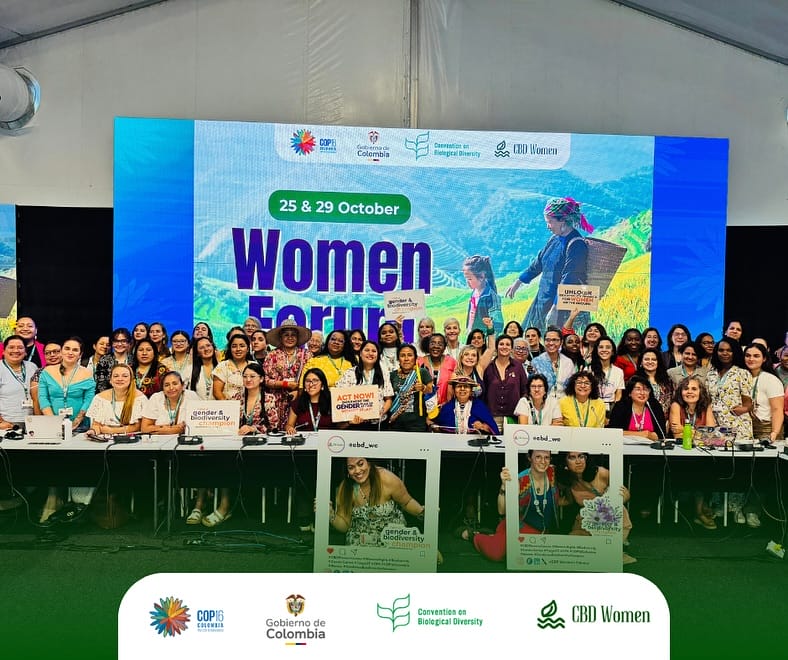
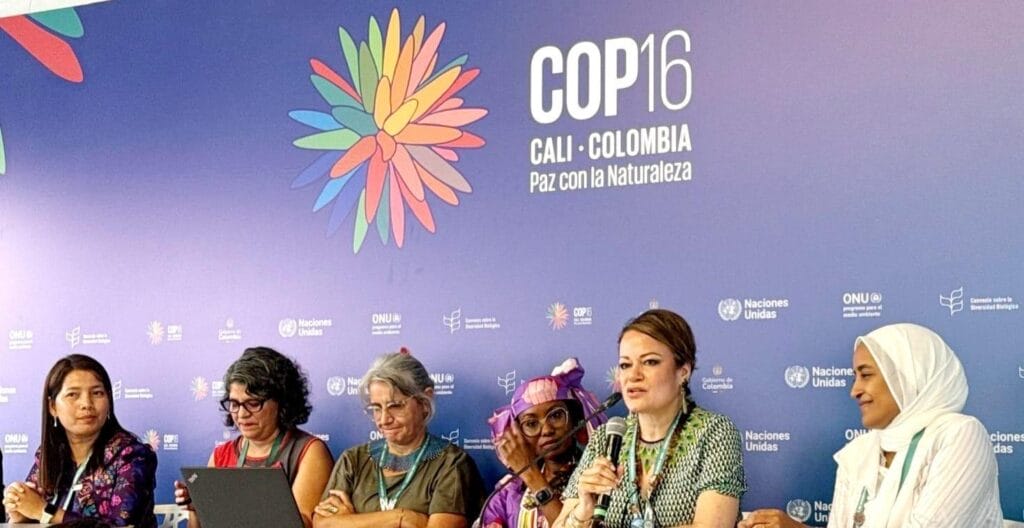
Looking ahead: the future of the CBD Women’s Caucus
Today, the CBD Women’s Caucus continues to be a strong and vibrant network with over 700 members worldwide, including 350+ organisations from 90 countries. Its priorities remain clear:
- Advocating for the recognition of women’s contributions to biodiversity conservation.
- Ensuring gender-responsive policies at both international and national levels.
- Empowering women, particularly Indigenous and local leaders, to engage in CBD negotiations.
- Monitoring and influencing the implementation of gender-related decisions within the CBD.
As biodiversity challenges grow, the CBD Women’s Caucus stands firm in its mission: ensuring that gender equality is not just an afterthought but a fundamental pillar of biodiversity conservation and sustainable development.

